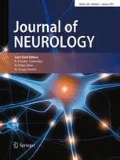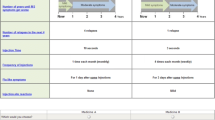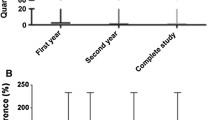Abstract
Background
The complexity and cost of injection treatment can represent a formidable challenge for patients affected by a chronic illness, particularly those whose treatment is primarily preventative and only modestly effective on the more conspicuous symptomatic aspects of the disease process. The aim of this investigation was to identify which factors most influenced nonadherent behavior with the available diseasemodifying injection therapies for multiple sclerosis (MS).
Methods
A multicenter, observational (threewave) study using surveys was developed and administered to patients with MS through the World Wide Web. Healthcare providers at 17 neurology clinics recruited patients for the study.
Results
A total of 798 patients responded to the baseline wave of the study (708 responded to all three waves). The nonadherence rates for all patients (missing one or more injections) across these waves remained relatively stable at 39 %, 37 %, and 36 %, respectively. The most common reason participants listed for missing injections was that they simply forgot to administer the medication (58 %). Other factors including injection-site reactions, quality of life, patients’ perceptions on the injectable medications, hope, depression, and support were also assessed in relation to adherence.
Conclusions
This study characterizes factors that are associated with failure to fully adhere with disease modifying injection therapy for MS and underscores the principles associated with optimizing adherence and its implications for effective treatment of the disease process in MS.
Similar content being viewed by others
References
Beck A, Steer R, Ball R, Ciervo C, Kabat M (1997b) Use of the Beck Anxiety and Depression Inventories for Primary Care with medical outpatients. Assessments 4:211–219
Benedict RHB, Fishman I, McClellan MM, Bakshi R, Weinstock-Guttman B (2003) Validity of the Beck Depression Inventory-Fast Screen in multiple sclerosis. Mult Scler 9:393–396
Bernal I, Domenech E, Garcia-Planella E, Marin L, Manosa M, Navarro M, Cabre E, Gassull MA (2006) Medication-taking behavior in a cohort of patients with inflammatory bowel disease. Dig Dis Sci 51:2165–2169
Bulloch AG, Adair CE, Patten SB (2006) Forgetfulness: a role in noncompliance with antidepressant treatment. Can J Psychiatry — Revue Canadienne de Psychiatrie 51:719–722
Cohen B (2006) Adherence to diseasemodifying therapy for multiple sclerosis. Int J MS Care 8:32–37
Devonshire V, Lapierre Y, MacDonell R, Ramo Tello C, Patti F, Fontoura P, Suchet L, Hyde R, Balla I, Kieseier B, Frohman E, Group obotGS (2006) The Global Adherence Project — A multicentre observational study on adherence to disease-modifying therapies in patients suffering from relapsing-remitting multiple sclerosis. In: European Committee for Treatment and Research in Multiple Sclerosis. Madrid, Spain
Fraser C, Hadjimichael O, Vollmer T (2003) Predictors of adherence to glatiramer acetate therapy in individuals with self-reported progressive forms of multiple sclerosis. J Neurosci Nursing 35:163–170
Frohman EMDP, Phillips TMDP, Kokel KPAC, Van Pelt JPA, O’Leary SRN, Gross SMSW, Hawker KMD, Racke MMD (2002) Disease-Modifying Therapy in Multiple Sclerosis: Strategies For Optimizing Management (Article). Neurologist 8(4):227–236
Garcia-Gonzalez A, Richardson M, Popa-Lisseanu MG, Cox V, Kallen MA, Janssen N, Ng B, Marcus DM, Reveille JD, Suarez-Almazor M (2008) Treatment adherence in patients with rheumatoid arthritis and systemic lupus erythematosus. Clin Rheumatol 27(7):883–889 (Epub 2008 Jan 8)
Group TIMSS (1993) Interferon beta-1b is effective in relapsing-remitting multiple sclerosis. I. Clinical results of a multicenter, randomized, double-blind, placebo-controlled trial. Neurology 43:655–661
Harzke AJ, Williams ML, Nilsson-Schonnesson L, Ross MW, Timpson S, Keel KB (2004) Psychosocial factors associated with adherence to antiretroviral medications in a sample of HIV-positive African American drug users. AIDS Care 16:458–470
Herth K (1992) Abbreviated instrument to measure hope: development and psychometric evaluation. J Adv Nursing 17:1251–1259
Johnson KP, Brooks BR, Cohen JA, Ford CC, Goldstein J, Lisak RP, Myers LW, Panitch HS, Rose JW, Schiffer RB, Vollmer T, Weiner LP, Wolinsky JS, Copolymer 1 Multiple Sclerosis Study G (2001) Copolymer 1 reduces relapse rate and improves disability in relapsing-remitting multiple sclerosis: results of a phase III multicenter, double-blind, placebo-controlled trial. 1995. Neurology 57:S16–S24
Krupp LB, Rizvi SA (2002) Symptomatic therapy for underrecognized manifestations of multiple sclerosis. Neurology 58:S32–S39
Mohr DC, Boudewyn AC, Likosky W, Levine E, Goodkin DE (2001) Injectable medication for the treatment of multiple sclerosis: the influence of self-efficacy expectations and injection anxiety on adherence and ability to self-inject. Ann Behav Med 23:125–132
Mohr DC, Goodkin DE, Likosky W, Gatto N, Baumann KA, Rudick RA (1997) Treatment of depression improves adherence to interferon beta-1b therapy for multiple sclerosis. Arch Neurol 54:531–533
Osterberg L, Blaschke T (2005) Adherence to medication (see comment). N Engl J Med 353:487–497
Russell CL, Kilburn E, Conn VS, Libbus MK, Ashbaugh C (2003) Medication-taking beliefs of adult renal transplant recipients. Clinical Nurse Specialist 17:200–208; quiz 209–230
Sabate E (2003) Adherence to Long-Term therapies — Evidence for Action. World Health Organization, Geneva Switzerland
Sadovnick AD, Remick RA, Allen J, Swartz E, Yee IM, Eisen K, Farquhar R, Hashimoto SA, Hooge J, Kastrukoff LF, Morrison W, Nelson J, Oger J, Paty DW (1996) Depression and multiple sclerosis. Neurology 46:628–632
The National Clinical Advisory Board of the National Multiple Sclerosis Society (2008) Assessment Management of Cognitive Impairment in MS. www.nationalmssociety.org. Exput Opinion Papus
Vickrey BG, Hays RD, Harooni R, Myers LW, Ellison GW (1995) A healthrelated quality of life measure for multiple sclerosis. Qual Life Res 4:187–206
Viswanathan H, Lambert BL (2005) An inquiry into medication meanings, illness, medication use, and the transformative potential of chronic illness among African Americans with hypertension. Research in Social & Administrative Pharmacy: RSAP 1:21–29
Walker EA, Molitch M, Kramer MK, Kahn S, Ma Y, Edelstein S, Smith K, Johnson MK, Kitabchi A, Crandall J (2006) Adherence to preventive medications: predictors and outcomes in the Diabetes Prevention Program. Diabetes Care 29:1997–2002
Wallin MT, Wilken JA, Turner AP, Williams RM, Kane R (2006) Depression and multiple sclerosis: Review of a lethal combination. J Rehabil Res Dev 43:45–52
Wray J, Waters S, Radley-Smith R, Sensky T (2006) Adherence in adolescents and young adults following heart or heart-lung transplantation. Pediatr Transplant 10:694–700
Author information
Authors and Affiliations
Corresponding author
Rights and permissions
About this article
Cite this article
Treadaway, K., Cutter, G., Salter, A. et al. Factors that influence adherence with disease-modifying therapy in MS. J Neurol 256, 568–576 (2009). https://doi.org/10.1007/s00415-009-0096-y
Received:
Revised:
Accepted:
Published:
Issue Date:
DOI: https://doi.org/10.1007/s00415-009-0096-y




